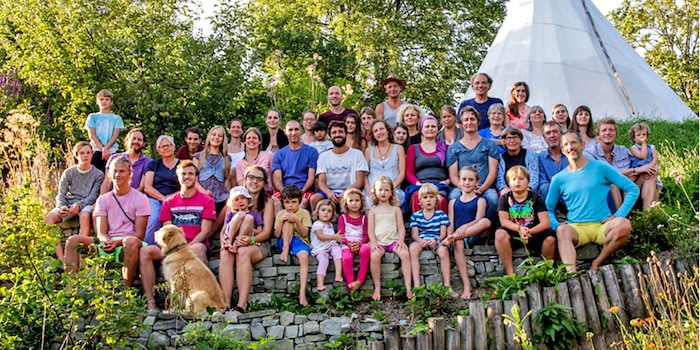
«I’d had enough of the conventional life»
You can’t go anywhere these days without hearing the word sustainability. Everyone wants to do their bit. The thing is, a lot of people drag their feet about this issue. But not me. I visited Toggenburg and got to know a community who are putting their money where their mouth is – more or less.
The journey there didn’t half drag. From Zurich I had to change three times. As time passed, I saw fewer and fewer houses. I thought I’d finally reached my destination, but I couldn’t get my hopes up yet. I was only in Degersheim so I still had another fifteen minutes uphill. In the blazing sun and laden down with a laptop and camera. The joys.
Degersheim is on the outer edge of Toggenburg in the canton of St. Gallen. The village is totally idyllic, surrounded as it is by hills and mountains. All around are green meadows and right in the centre stands a church. As lovely as it all looks, I’m only partly interested because I’m just passing through and bound for the outskirts of the village.
70 people stand for sustainability
The Sennrüti community fosters an environmentally, economically and socially sustainable way of life. Integration and spirituality tie the concept together. The place is home to about 70 people, including children and volunteer helpers, who decided to live together on a large piece of land on the edge of the village. Their aim is to create a sustainable way of life, whereby people and nature can coexist.
Sounds good to me. I should also be a bit harder on myself. While I do try to take a reusable bag for my shopping and put my vegetables straight in the basket (without any plastic bags), I do tend to be quite wasteful. For instance, if I barbecue anywhere I take single-use plastic cutlery. So there’s definitely room for improvement.
After my aforementioned brief walk up the hill – which felt anything but brief – I’m standing at the entrance. There is nothing for it but to go in and scout around for René Hirschi. I notice a kind of buzzer phone and find his name name on it. After the second ring, a child’s voice answers: «My dad’s just coming.» And the little boy is right. A minute later, René Hirschi appears in the entrance hall to welcome me.
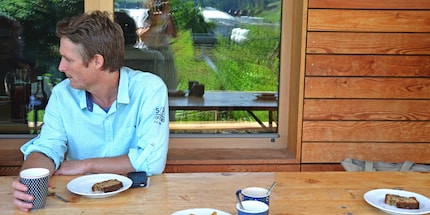
Nothing is easy at the start
Hirschi founded the Sennrüti community nine years ago with his wife, their parents and a few friends. But the idea had been brewing in his head much longer. «I’d been wanting to escape from conventional life years before that. I asked almost everyone I knew if they wanted to be part of a project like this.» We ended up with a small group who were ready to put the theory into practice.
«We searched high and low in Switzerland. We looked in Aargau, in Luzern and even in Degersheim. I never thought we’d wind up in Eastern Switzerland. To be honest, if I’d had my way I wouldn’t have moved here,» explains Hirschi. The thing was, everywhere they looked they’d come up against political or financial obstacles – everywhere except in Degersheim. The owners at the time were keen on the idea, as they thought sustainability was pretty important.
«Fast-forward to today and I can truly say I love this area.» While it is nice here, it is also rather bleak. But I can imagine that when you’ve got 69 "housemates" it’s not so much of an issue.
The site encompases three buildings. There’s the main building, which houses most of the flats and in its past life was a recuperation centre. «We had to completely renovate so we could turn guest rooms into flats,» explains Hirschi. To do that, they put together a building team that went on to be in charge of site management. Whatever they could tackle alone they did and for everything else they turned to external workers from the local area.
At the start of the project they also hired an architect. «But with time we realised ourselves that we didn’t need his help any more.» In fact, there’s construction work underway at the moment. They’re building a new flat on the topmost floor for a family moving from the village.
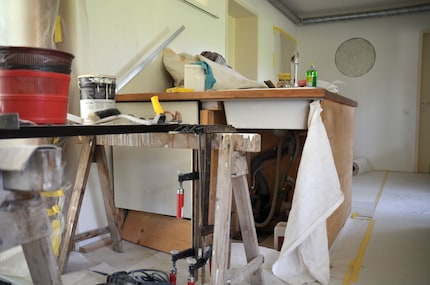
Gardening: a labour of love
Between the three buildings – the main house, neighbouring building that’s home to more flats, and a building with meeting rooms – there’s a large garden. I fall for it immediately. I could certainly let off steam here. The same probably goes for all the children. The garden has a play area, a vegetable and berry patch and even a sauna in a kind of yurt.
Marianne has been living in the community for three and a half years and mostly looks after the vegetables. «When we bought the place, the garden was completely overgrown. We kept digging beds for growing food as part of permaculture training.» Permaculture is the conscious design of surroundings that focuses on patterns in nature. This is what creates an environmentally sustainable system.
The term comes from «permanent agriculture». By following a system like this, the garden team can improve the soil with compost, swill (liquid manure) and charcoal. To do that they «charge» the coal with active microorganisms and urine. Then they either compost the coal or add it straight to the planting bed. Don’t ask me where the urine comes from and how it’s collected… I’m still none the wiser.
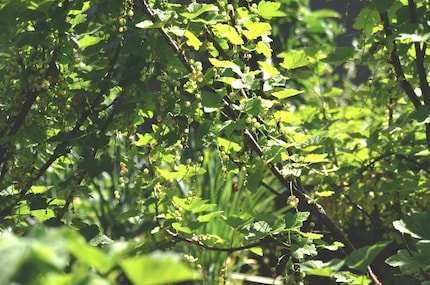
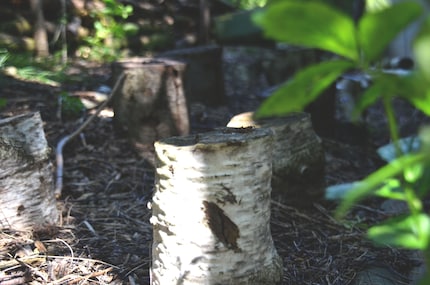
«This year we’ve got lots of lice wreaking havoc,» explains Marianne. I can vouch for that. These pests have even shown their faces on my balcony. «We try to keep these at bay with neem emulsion,» she says. «Neem oil is extracted from seeds and fruit that come from neem trees. It has many uses, including natural pesticide.» You learn something new every day.
Marianne emphasises that it doesn’t matter whether they’re driving out lice or planting new types of vegetables, the garden team always comes from a place of love. When possible, they try and work to the sowing calendar set out by Maria Thun, a pioneer in biological-dynamic planting. For Marianne, as I’m sure is the case with many others, gardening is a case of learning by doing.
But things are set to get a bit more professional around here. René explains that an extensive garden concept focusing on permaculture is set to be developed. «Once that’s established, we want to create a garden manager position.» At the moment, they get about 75% of their food from their own garden and organic farms in the area. The remaining 25% comes from regional shops.
René’s dream is to one day have all their food needs met by their own garden. They’ve already managed to source all their vegetables without plastic packaging, whether they’re grown on-site or bought from elsewhere. On that point they’re already well ahead of the big supermarket chains.
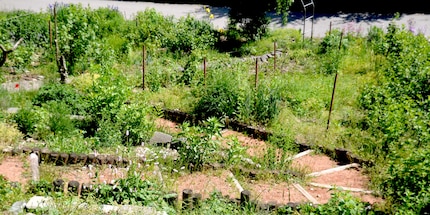
«Social responsibility is often forgotten about»
The Sennrüti community attaches importance to other things so they can lead as sustainable a life as possible. For instance, they take additional environmental steps, such as adopting solar energy, using rainwater in the toilets and washing machines, and not buying individual cars. That’s not to say they don’t have a way of getting from A to B. The community has six cars to share between them.
«We’re on the right track. We might not be there yet, but each day we try to get closer to 100% sustainability.» For René, being there equates to self-sufficiency, all energy from renewable sources, and zero waste. But that’s bound to be a while off yet. As well as all the environmental aspects, social sustainability also plays a big part. According to the Sennrüti community, this is something that is neglected way too much these days.
«Because we live in such close proximity, we get a mirror held up to ourselves and our actions much more. It means you have to face up to conflicts. One rule is that we have to talk with each other rather than over each other.» René explains this helps avoid bad feelings that can start to bubble beneath the surface. «It’s important so we keep the peace in our community,» says René.
That’s why the Sennrüti community also came up with their own decision-making tool, which is a kind of attunement. It’s based on three levels: factual, emotional and intuitive. They only decide based on the latter. It works by them describing images that automatically come into their head. That lets them see if their stance is negative or positive.
«We use this tool for important decisions, such as accepting people into the community or allocating flats. It might take an hour or two but it saves us endless, uncomfortable discussions,» clarifies René. The principal of quiet consensus usually reigns. Decisions are made public through meeting minutes. Whoever opposes a decision has a week to say so, but they have to help find an alternative.
Personally, I really like the basic principle and the vision of a community like this. It’s commendable the way they’ve weaved sustainability into all facets of life. But making decisions based on intuitive images? Nah, that’s a step too far for me. I don’t really get why a simple «yes» or «no» wouldn’t suffice. That would surely be quicker and in my eyes a lot clearer. But hey, I guess I don’t always have to understand everything.
Established in the region
Everyone who lives in the community has a «normal» job. Let’s face it, the whole thing has to be financed somehow. René reckons there are more obstacles in the way of achieving a 100% autonomous life in Switzerland than there are anywhere else. «Land prices alone mean we can’t disconnect ourselves from the rest of the world entirely.»
Apart from which, that’s not Sennrüti’s goal – far from it. In fact, the community is actively involved in the region. Many inhabitants work in the social sector. René, for instance, has a job in youth work in Flawil.
The community get strong financial support from the state, private donors and the Raiffeisen bank as well as from each inhabitant’s own income. While this financial input is what lets the community fund common projects, you do need a salary to finance your own living costs. Food grown in the garden is mostly for the community kitchen rather than personal use.
During the week, you can eat here almost every day and they sometimes do lunch on special occasions. While the kitchen always serves up veggie food, what you do in your own home is your business. That’s not to say the vegetable patches are off limits. The people in the community can always take a bit if they want. This usually happens when the garden team tell everyone: «the courgette is ripe! Come and get some.» I already know who’d be at the front of that queue...
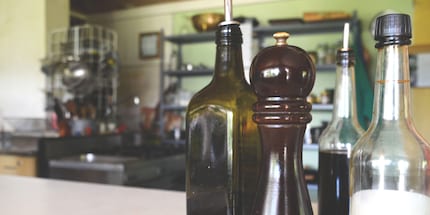
I like the rationale
There’s a certain amount of fluctuation in Sennrüti as you’d expect in any settlement. It’s usually either because the residents can’t identify completely with the way of life, because something changes in their life or because life in the community is too intense. But when it’s a good fit, people stay.
As I get to thinking about it, I start to wonder if I could imagine myself in a community like this. The principle of sustainability that the whole thing hinges on appeals to me. Particularly because they focus on economic and social sustainability rather than just environmental sustainability.
At Sennrüti, people also talk openly so as to avoid misunderstandings. I’m sure that would do me good. Too often I keep my thoughts to myself and end up in a bad mood.
I’d also be right at home in the big garden with the planting beds, play area and fire pit. I could let my greenish fingers get properly green and enjoy some much-needed exercise. If I just sit around the whole day I can be quite annoying. At least that’s what people have told me.
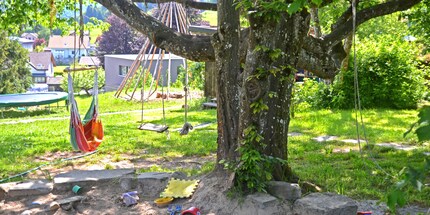
In spite of all these positives I come across during the day, I don’t think I’m cut out for community living. To get a definitive answer, I’d need to spend some time at Sennrüti. But that would only be something I could consider in a few years time. At the moment I’m quite happy in my 3.5-bedroom flat in greater Zurich. I like the infrastructure, the fact nowhere takes me too long to get to and that it’s easy to go and see friends.
Where I’m at in my life just now, I think I’d find Degersheim too rural, too quiet and not diverse enough. That being said, I’d like to integrate sustainability more into my life – all three aspects of it. I just don’t want to have to give my whole life up to sustainability.
My life in a nutshell? On a quest to broaden my horizon. I love discovering and learning new skills and I see a chance to experience something new in everything – be it travelling, reading, cooking, movies or DIY.
Interesting facts about products, behind-the-scenes looks at manufacturers and deep-dives on interesting people.
Show all